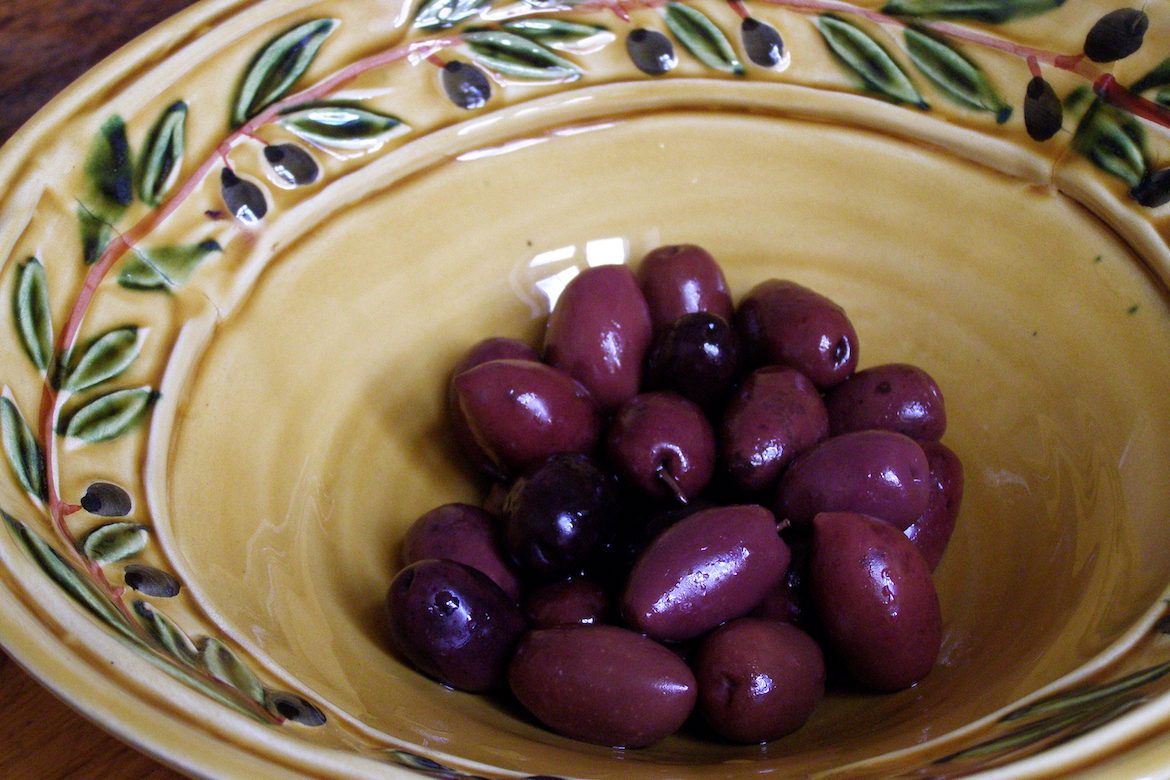Kalamata olives are a culinary staple enjoyed all around the world and it’s easy to see why, since these fruits are so tasty and healthy!
To truly appreciate olives, let’s dive deeper into the history of olives, why Kalamata olives are so special, and what health benefits we can expect from eating them regularly.
Quick Greek history of olives and olive trees
The use of olives by the Greeks dates back thousands of years ago.
The ancient Greeks used olives and olive oil for many different purposes: cooking, hair, skin, and lighting. They used the wood from olive trees since they’re incredibly sturdy.
Throughout Greek history, there have been many long-lived, famous olive trees. Today, the Finix Olive in Crete is estimated to be at least 2,000 years old. Olive trees symbolize honor, victory, and culture to Greeks.
What are Kalamata olives?
Kalamata olives are dark-purple, almond-shaped, and meaty-textured olives. They come from Kalamata, which is a small city in southern Peloponnese, Greece.
People commonly mistake them for black olives, but Kalamata olives taste different.
These specific olives are hand-picked and harvested in late fall. They’re often cured in vinegar brine for best taste and to remove its naturally bitter taste. This extensive process yields tasty, high-quality olives.
Amazing health benefits of Kalamata olives
It’s true. A Kalamata olive a day can keep the doctor away. Let’s uncover some of the many reasons to enjoy olives every day.
Kalamata olives support heart health
Olives are rich in healthy fats called monounsaturated fats (MUFAs)! MUFAs help lower your body’s bad cholesterol and raise your good cholesterol.
A review of many different studies revealed that MUFAs can decrease the risk for heart disease and stroke. This effect was particularly true with olive oil compared to other sources of MUFAs. [1]
Kalamata olives may support weight loss
Looking for a healthy snack to support your weight loss goals? Well, look no further.
Olives are low in calories but high in healthy fats and fiber to keep you full. A serving of 10 Kalamata olives contains up to 5 grams of fiber, 12.5 grams of fat, and 175 calories.
Additionally, studies now show that eating a high-fat, low-carb diet that consists of plenty of MUFAs is effective for weight loss. This was true even without reducing any calories in the diet. [2]
Kalamata olives protect against oxidative damage
As we get age, free radicals in our bodies can cause oxidative stress and damage. Health experts recommend eating more antioxidants to help counter this effect!
Olives are high in polyphenols, which act as strong antioxidants in your body. [3] So, the more olives you eat, the more you’ll fight off free radicals.
Kalamata olives are nutritious
Olives are rich in the following vitamins and minerals:
- Vitamin A, which supports eye and skin health
- Vitamin E, which serves as an antioxidant and supports heart health
- Iron, which prevents iron-deficiency (anemia) and helps transfer blood from our lungs to the rest of the body
- Calcium, which supports healthy bones and helps your nerves work properly
- Copper, which supports healthy bones as well as blood cells alongside iron
Kalamata olives protect against cancer
A randomized clinical trial in rats found that a Mediterranean diet high in olive oil can reduce the risk for breast cancer compared to standard diets. [4]
It would be great to see similar effects on other types of cancer in the future through further studies.
The bottom line
Olives have a rich history of use by the Greeks. Kalamata olives are unique given their specific geographic origin and how they are prepared. The more olives we eat, the more health benefits we can expect and lower the risk for chronic disease.
An olive a day may truly keep the doctor away. Next time you reach for a salty snack, why not grab a handful of Kalamata olives instead?
References
- Schwingshackl L, Hoffmann G. Monounsaturated fatty acids, olive oil and health status: a systematic review and meta-analysis of cohort studies. Lipids Health Dis. 2014 Oct 1;13:154. doi: 10.1186/1476-511X-13-154.
- Ebbeling CB, Feldman HA, Klein GL, Wong JMW, Bielak L, Steltz SK, Luoto PK, Wolfe RR, Wong WW, Ludwig DS. Effects of a low carbohydrate diet on energy expenditure during weight loss maintenance: randomized trial. BMJ. 2018 Nov 14;363:k4583. doi: 10.1136/bmj.k4583. Erratum in: BMJ. 2020 Nov 3;371:m4264.
- Nediani C, Ruzzolini J, Romani A, Calorini L. Oleuropein, a Bioactive Compound from Olea europaea L., as a Potential Preventive and Therapeutic Agent in Non-Communicable Diseases. Antioxidants (Basel). 2019 Nov 22;8(12):578. doi: 10.3390/antiox8120578.
- Amel N, Wafa T, Samia D, Yousra B, Issam C, Cheraif I, Attia N, Mohamed H. Extra virgin olive oil modulates brain docosahexaenoic acid level and oxidative damage caused by 2,4-Dichlorophenoxyacetic acid in rats. J Food Sci Technol. 2016 Mar;53(3):1454-64. doi: 10.1007/s13197-015-2150-3. Epub 2016 Jan 5.
About the author
Chrissy Arsenault, MBA, RDN, LD, is a registered dietitian nutritionist and licensed dietitian based in Indianapolis. She obtained her bachelor of science in nutritional science at Cornell University and her MBA at Indiana University Kelley School of Business. She is the founder and CEO of a nutrition communications firm called Pink Pamplemousse LLC, where she creates engaging nutrition and wellness content for clients. She has also coached clients on various health conditions including heart disease, obesity, digestive issues and diabetes over the last seven years. Visit Chrissy’s website.
















